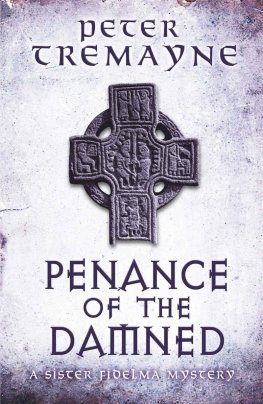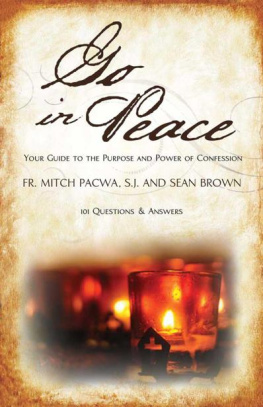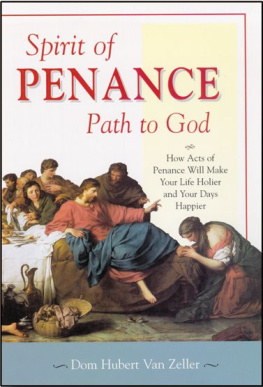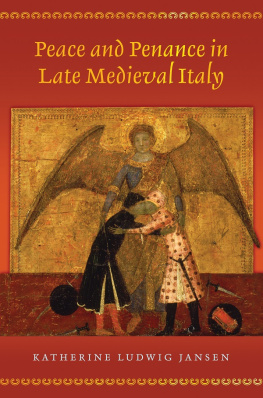Sackcloth and Ashes
The Bloomsbury Lent
Book 2014
Sackcloth
and
Ashes
Penance and Penitence in a
Self-centred World
Ann Widdecombe
Contents
Its meant to be hard
T he scene is a familiar one. Lent is looming and the same journalists who ring up public figures to enquire about New Year resolutions are now ringing to enquire about Lenten vows. I tell them I am giving up everything except water to drink. No alcohol, tea, coffee or fruit juices. Just fizzy Highland Spring.
The only unpredictable aspect of the next two questions is the order in which they will be presented: how much weight do I expect to lose and what will I do with the money saved? Each year I have to explain that it is not about weight or saving money: it is a penance. Drinking a glass of cold HO on a freezing cold February morning when all around you are gulping their cappuccinos and expressos is a penance.
Oh, yes, that must be hard, is the invariable response.
Not as hard as Calvary.
Eh?
I sigh. Its meant to be hard. Its penance .
But what is penance other than the ritual of forfeiting chocolates in the run-up to Easter? What is its purpose? Is it an individual or collective activity? Is the quality of penance affected by whether it is voluntary or imposed? Does mortification of the flesh always involve the flesh? Can penance help towards salvation or is it only a demonstration of repentance or regret? Is there a difference between penance and punishment? Can penance enhance prayer? Is it a necessary precursor of forgiveness? Or is it simply a rather conceited, man-made distraction from an all-forgiving God, whose Son performed the penance to end all penance?
Todays world, at least in its developed areas, is about accumulating as much as possible as quickly as possible. The me-generation looks for rewards in money, celebrity and comfort. Credit cards take the waiting out of wanting. A whole variety of medicines and cosmetics promise instant relief, instant cure, instant youth. Patience is no longer a virtue highly prized but penance is impossible without it. For to be penitent involves a pause amidst the madness, time for reflection and for self-examination.
Our ancestors were comfortable with penance. In 1077 the Holy Roman Emperor, Henry IV, stood for three days bare-headed in the snow to persuade the Pope to reverse his excommunication. A century later King Henry II walked to Canterbury in sackcloth and ashes to be beaten by the monks as a penance for the death of Thomas A Beckett. Today our reaction would be to send for the men in white coats.
Eyebrows are raised at members of Opus Dei who still practise selfflagellation and I admit mine wander upwards too and I tut-tut about remnants of the Dark Ages but is penance really now no more than 40 days without a glass of wine or ten Hail Marys between confession and Coronation Street?
So what is penance in the twenty-first century? This slight volume, which is not a theological guide so much as a curious laymans exploration, seeks some answers.
I n order to remember when Britain was not what has come to be called a Me, Me, Me society one probably has to go back to the 1950s and much maligned 1960s.
In the post-war years it would have been pointless to set store by material goods because they were in short supply. Everyone was in a permanent state of going without something and shopping was a carefully considered activity. For six years all anyone had been focussed on was surviving, on hoping husbands, brothers and sons would return, that both Hitlers bombs and the dreaded telegram would pass on by and once that was all over people craved only security and a gradual return to normality.
Not much was wasted. Sheets were patched, socks were darned and so were stockings and jerseys. School uniform was bought much too big and then worn until it was much too small. The washing machine boom had yet to happen and cleaning was sufficiently expensive for children to be told to make their clothes last a term during which time spills were sponged off. Taking everything off at the end of the day and dropping it all in the wash basket was unheard of. Clothes were handed down not only between siblings but between friends.
Central heating was not the norm and I can remember running between rooms to escape cold halls and landings and jumping over the floor to reach the warmth of the carpet (which was not fitted).
If material goods were not plentiful instant solutions were also few and far between. There were no credit cards to eliminate the tedium of saving up, no instant supply of antibiotics to kill infections, no faxes or emails to hasten the post, no mobile telephones to say whatever you wanted to say there and then, no self-correcting typewriters let alone computers. People were content to rent rather than immediately buy their houses, older children stayed at home until they married, families with a car thought themselves doing well. Britons holidayed at the seaside in Britain.
People with problems had no choice but to work through them. Divorce was difficult to obtain and the process was messy, abortion was illegal, money hard to borrow. Families looked after their own especially their elderly.
It was all we knew and therefore we accepted it. With emails not even a twinkle in anybodys eye, we had to wait patiently for the post and for the operator to connect a trunk call and it did not seem at all odd. There were two TV channels not 200. Children played endless games of make-believe.
The adults had been through so much that there was a hugely strong sense of community and we looked after our neighbours as a matter of course.
I would absolutely not like to return to live in the 1950s but I sometimes find myself yearning for the days when we were not all in such a tearing hurry and not surrounded by the roar of unrestrained consumerism.
The 1960s brought hope and fun. Suddenly there was much more colour about bright orange dresses and stiletto heels before, half way through that wild decade, dresses, handbags and bedlinen exploded into the kaleidoscope of colours dubbed psychedelic. The shops sported an ever-expanding range of make-up, hemlines shot upwards, there was money to spare for pop records, tights replaced stockings and were discarded when laddered, carpets covered rooms, washing machines replaced red-elbowed women.
Prosperity was certainly arriving but so was something else a rebellion against traditional morality, the beginnings of the I can do what I want and it is nobody elses business approach of moral relativism. Yet it was still an innocent decade. The Pill was in its infancy, drugs distrusted, abortion and homosexuality made legal only in 1967 and 1968 and divorce made easier only in 1969. There was wild talk of free love and trial marriages but the conventional order of marriage, setting up home and saving for children was still largely observed as was the womans role in the nurture of children and mans as breadwinner. It was all much less daring than the picture many, usually nostalgically, paint.
It was the 1970s which saw the Me-culture take off as people decided to recognise nothing but their immediate need for happiness which was often no more than a need for instant gratification or instant solution. Promiscuity became widespread. Why wait? So did the use of credit. Why wait? So did moving out of the family home at an early stage. Why wait?
The 1980s then added I can have what I want to I can do what I want, as Britain boomed, the enterprise culture blossomed and everyone believed he could be a millionaire by 30. The women were encouraged to be as competitive as the men and children were farmed out to childminders so Mum and Dad could both work.








